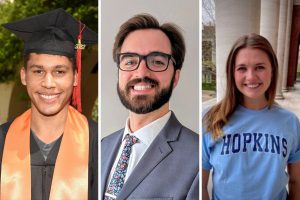
The National Science Foundation recently awarded three Johns Hopkins mechanical engineering graduate students with the 2023 Graduate Research Fellowship Program award – one of the nation’s top STEM fellowship programs.
The NSF Graduate Research Fellows program is the oldest graduate fellowship of its kind. Fellows receive three years of financial support in the form of an annual stipend of $37,000 and a $12,000 cost of education allowance for tuition and fees paid to the institution. They have opportunities for international research and professional development and have the freedom to conduct their own research.
The 2023 NSF Graduate Research Fellows with ties to the Department of Mechanical Engineering are:
Noah Barnes
Noah Barnes is co-advised by Jeremy D. Brown and Axel Krieger and works in the area of medical robotics. His proposed research tackles the challenges of design, modeling, and control of soft micro-robots for minimally invasive surgery.
Originally from Springfield, Virginia, Barnes earned his bachelor’s degree in mechanical engineering with a minor in control and dynamical systems from the California Institute of Technology. At Caltech, he participated in volunteer tutoring, played for the university’s NCAA basketball team, and conducted research in rehabilitation robotics.
Jesse Haworth
Jesse Haworth is a PhD student at the Johns Hopkins Laboratory for Computation Sensing and Robotics (LCSR). Jesse has worked in both Russell Taylor’s Computer Integrated Interventional Systems lab (CIIS) and Axel Krieger’s Intelligent Medical Robotics Systems and Equipment lab (IMERSE). As part of CIIS, Jesse partnered with two physicians to develop clinically representative bone phantoms and a cooperative robotic workflow for mandibular osteotomy, with the aim of minimizing mistakes and improving patient outcomes. In the IMERSE lab, Jesse has led the development of a microvascular anastomosis positioning system that automates suturing of 5 mm blood vessels using robotics and OCT image guidance. This work is being further developed to enable fully autonomous suturing on 1 mm micovasculature.
Haworth hails from rural Iowa and received his bachelor’s degree in biomedical engineering at the University of Iowa. While at Iowa, he gained experience in device development by working with MADE and CIVCO to design and manufacture medical devices. Upon graduating, he joined Medical Murray as a Research and Development (R&D) Engineer, where he learned the details of quality systems, project management, and client and vendor relations. He also played a lead role in regulatory documentation, device design, and product testing.
Mariana Smith
Mariana Smith is from Leesburg, VA and is completing her undergraduate degree in mechanical engineering, with a minor in engineering management, from Vanderbilt University with an expected graduation date of May 2023. As an undergraduate, her research in Vanderbilt’s MED Lab investigates novel folding geometries for tendon-actuated continuum robots for use in lung surgery. Outside of research, she has enjoyed working as an engineering consultant at Merge Medical Device Studio and mentoring VU undergraduates as a SyBBURE Searle Research Fellow.
As an incoming LCSR Distinguished Graduate Fellow and Distinguished ME PhD Fellow at Johns Hopkins, Mariana will continue exploring the actuation, sensing, autonomy, haptics, and modeling of robotic systems. She plans to conduct collaborative research under the guidance of Axel Krieger and other distinguished faculty in LCSR, in preparation for a career in medical robotic design.